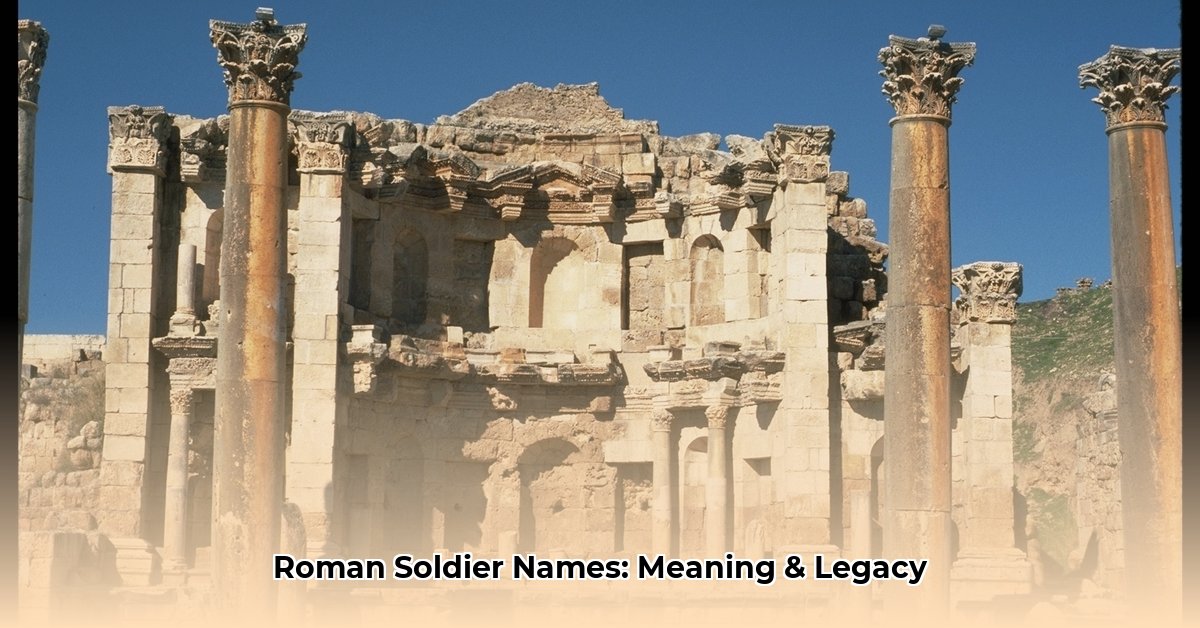Have you ever considered what profound insights might be embedded within a simple name? For an ancient Roman soldier, his name was far more than a mere identifier. It functioned as a living testament to his lineage, a beacon of his aspirations, and a reflection of the core values that underpinned the formidable Roman Republic and Empire. These names were indeed like finely crafted time capsules, each whispering stories of a society that prized courage, skill, and disciplined ambition. By delving into the etymology and communal significance of these monikers, we can unlock a deeper understanding of Roman military culture and its enduring impact. So, what critical lessons can we glean from the names that highlighted valor, strategic acumen, and exceptional leadership?
Learn about the military hierarchy of the Roman Empire.
Decoding Roman Soldier Names: Beyond Mere Labels
In the disciplined ranks of the Roman legions, a soldier’s name was never a matter of chance. It was often a meticulously chosen designation, a powerful tool for instilling values, signifying social standing, and even hinting at an individual’s potential. This deliberate approach to nomenclature offers a fascinating window into Roman identity and their sophisticated historical naming practices. How deeply did a name truly shape a Roman soldier’s path and perception within this legendary military machine?
Ancient Roman citizens, including soldiers, typically followed a tripartite naming system, or tria nomina, although variations and additions were common throughout Roman history. This system provided a layered identity.
- Praenomen (Given Name): Similar to a first name, the praenomen was chosen by the parents and used infrequently in formal settings, primarily within the family. Examples include Marcus, Lucius, and Gaius. While common, the limited pool of praenomina (around 15-20 in regular use for men) often necessitated calling individuals by other parts of their name.
- Nomen (Clan Name): This was the most important part, identifying an individual’s gens, or clan. Names like Valerius, Julius, and Claudius were potent badges of honor, immediately proclaiming a soldier’s clan affiliation and signifying his social standing within Roman society. This name profoundly influenced an individual’s respect and opportunities within the army.
- Cognomen (Family Name/Nickname): An additional surname, the cognomen often distinguished branches within a large gens or originated from a personal characteristic, occupation, or place of origin. For example, Publius Cornelius Scipio Africanus received “Africanus” as a cognomen of honor for his victories in Africa.
- Agnomen (Added Name of Honor): Beyond their cognomen, Romans—especially successful generals—might receive an agnomen, an honorary name commemorating a significant achievement. This practice publicly celebrated those who excelled, creating lasting monuments to valor within the collective memory of the empire.
This intricate Roman naming system unveils the profound importance of familial connections and the pervasive desire to honor ancestral legacies, fostering a sense of continuity and collective purpose vital for military cohesion.
Names Reflecting Courage and Triumph
For an empire built on conquest, courage was paramount. It’s no surprise, then, that many Roman names championed this fundamental virtue, serving as daily reminders of the bravery expected on the battlefield.
- “Victor” (Conqueror): Could there be a more direct call to action? Derived from the Latin for “conqueror,” this name practically pulsed with the Roman drive for dominance. It wasn’t just a label; it was a constant, assertive affirmation of Rome’s military ambition and a profound dedication to achieving victory in every engagement. The very sound of “Victor” would have inspired a legionary to push past his limits, embodying the spirit of triumphant Roman expansion.
- “Invictus” (Unconquered): This powerful name, meaning “unconquered,” perfectly encapsulates the unyielding Roman spirit. It speaks to a profound resilience, suggesting an individual who would not yield under any circumstances. Bearing “Invictus” likely instilled a deep sense of perseverance, a critical trait for facing the relentless adversities of ancient warfare, from the Punic Wars to the Dacian campaigns.
- “Fortis” (Brave/Strong): Unambiguous in its meaning, “Fortis” literally translates to “brave” or “strong.” This name left no room for doubt about the qualities expected from its bearer. It served as a constant reminder of the unwavering courage and physical fortitude demanded of every soldier in the Roman army, a cornerstone of their tactical successes.
- “Maximus” (The Greatest): While not exclusive to soldiers, this name, meaning “greatest,” was highly aspirational and often adopted by those who had achieved or sought unparalleled glory. It was frequently used as a cognomen to distinguish a particularly distinguished member of a family. The popularity of “Maximus” underscores the Roman emphasis on achieving unparalleled greatness and forging a lasting legacy for both the individual and their gens.
These martial names went beyond mere identification; they were cultural affirmations, powerful psychological anchors, and perhaps even self-fulfilling prophecies, profoundly influencing the character and battlefield conduct of the men who carried them.
Names of Skill, Temperament, and Strategy
The Roman military’s success wasn’t solely built on brute force; it equally valued intelligence, discipline, and specific aptitudes. Certain names highlighted these nuanced strengths, indicating a soldier’s capabilities extended beyond raw power.
- “Celer” (Swift/Quick): In an army where rapid deployment and maneuverability were key, speed was a prized asset. “Celer,” translating to “swift” or “quick,” might have been bestowed upon soldiers celebrated for their agility and rapid decision-making. These individuals were likely invaluable as scouts, messengers, or quick-thinking combatants on the dynamic battlefield, highlighting the Roman appreciation for swift action.
- “Corvus” (Raven): The raven, a creature renowned for its intelligence, keen observation, and cunning, lends its qualities to the name “Corvus.” Such a name suggested its bearer possessed a sharp mind, excelling in information gathering and strategic planning. It is highly probable that individuals named Corvus distinguished themselves in reconnaissance missions or tactical development, embodying strategic foresight.
- “Severus” (Serious/Stern): Discipline and steadfastness were the bedrock of Roman military order. “Severus,” meaning “serious” or “stern,” denoted these very qualities. Soldiers bearing this name were likely the reliable enforcers of order, maintaining high morale and strict adherence to regulations. They were, in essence, the very backbone of the legion, ensuring unwavering discipline and consistency.
These names offer invaluable insights into the diverse roles and specialized capabilities within the highly organized Roman war machine, demonstrating that success was a complex interplay of power and precision.
Names Echoing Roman Life: Mythology, Virtues, Nature, and Occupations
Roman names drew deeply from the culture and environment that shaped them, extending beyond overt martial qualities to reflect broader societal values and natural inspirations.
- Mythology and Gods: Names directly inspired by Roman deities were common, imbuing their bearers with a connection to divine power or specific attributes. “Marcus,” derived from Mars, the god of war, directly linked an individual to martial prowess. “Minerva,” for women, honored the goddess of wisdom and strategic warfare.
- Roman Virtues: Concepts crucial to Roman identity were also enshrined in names. “Pietas” (dutifulness, devotion), “Honoria” (honor), “Victoria” (victory), and “Constantia” (steadfastness) were not just abstract ideals but living names, serving as constant reminders of the moral fiber expected from citizens and soldiers alike.
- Nature and Environment: The natural world provided a wellspring of names, reflecting a connection to the land and its elements. “Flora” (flowers), “Aurora” (dawn), and “Sylvanus” (forest) offered softer, yet still significant, associations with growth, new beginnings, or an untamed spirit, often for women or those connected to rural origins.
- Occupations and Titles: Some names stemmed from traditional roles or aspirations within Roman society. “Pontius” (bridge-builder), “Praetor” (leader/magistrate), or “Centurion” (commander of a century) could denote lineage from a family associated with such roles or aspirations towards them, underscoring the deep integration of civic and military life.
These varied origins illustrate the rich tapestry of Roman onomastics, where a name could signify not just a person, but a profound connection to the values, beliefs, and fabric of Roman society.
Names and the Roman Military Hierarchy
The Roman army’s complex hierarchy profoundly shaped individual identity, with a soldier’s name or title often reinforcing their defined role. From the commanding Legatus Legionis to the common legionary, each position carried specific responsibilities and an associated identity, often made explicit through naming conventions or honorary titles.
- Legatus Legionis: The highest-ranking officer, often a senator, commanded an entire legion. Their prestigious nomen and cognomen would broadcast their elite social standing and immense responsibility, a stark contrast to the common soldier.
- Tribunus Militum: Military tribunes, often younger men of senatorial or equestrian rank, served as staff officers or junior commanders. Their names would reflect their noble birth and the expectations of a future political or military career.
- Praefectus Castrorum: The camp prefect, typically a seasoned veteran who had risen through the ranks (often a former primus pilus), was responsible for the camp, equipment, and logistics. Their practical, earned title underscored their invaluable experience and pivotal role in the legion’s daily operations.
- Centurions (Centuriones): The backbone of the Roman army, centurions commanded a century (typically 80 men). These experienced, highly respected officers were chosen for their leadership and discipline. Their names might not be inherently “noble” but their proven valor on the battlefield brought immense personal honor. The “Primus Pilus” was the most senior centurion in a legion, a title that marked the pinnacle of an ordinary soldier’s career.
- Optio: The centurion’s second-in-command was responsible for maintaining discipline and marshaling the rear of the century in battle. Their name, while less prominent, held the weight of direct authority over the men.
- Signifer: As the standard bearer, the signifer carried the century’s standard (signum), a crucial rallying point. This prestigious role implicitly elevated the bearer, whose name became synonymous with the unit’s honor.
- Aquilifer: The aquilifer carried the legion’s sacred eagle standard (aquila). Losing the eagle was an unthinkable dishonor, making this a pivotal and highly respected position. The aquilifer’s name would forever be associated with the legion’s very soul and fighting spirit.
| Rank | Primary Responsibility | Naming/Identity Note |
|---|---|---|
| Legatus Legionis | Commanded the entire legion (4,200-6,000 men), appointed by Senate or Emperor, responsible for strategic planning and provincial governance. | High social standing, reflected in prominent nomen and cognomen, often from elite senatorial families. Their name symbolized ultimate authority and connection to Rome’s leadership. |
| Tribunus Militum | Staff officers, often sons of senators or equestrians, assisting the Legatus. Five per legion, with the laticlavius (senatorial) being second-in-command and the angusticlavii (equestrian) serving various administrative and tactical roles. | Names signified their noble lineage and potential for future political or military advancement. They embodied the youthful ambition of Rome’s elite. |
| Praefectus Castrorum | The camp prefect, third-in-command of the legion, responsible for all logistics, administration, maintenance of camp, equipment, and supplies. Typically an experienced soldier, former Primus Pilus. | This title was earned through decades of dedicated service, symbolizing practical expertise and the culmination of a distinguished career for a non-noble soldier. Their name represented invaluable experience. |
| Centurions | Backbone of the army, commanding a century (80-100 men). Responsible for training, discipline, and leading men in battle. Selected for exemplary leadership, experience, and courage. The “Primus Pilus” was the senior centurion of the entire legion, a highly respected and influential position. | While their personal names might not denote nobility, the title “Centurion” itself was a profound mark of honor, respect, and authority, earned through merit and proven battlefield performance. Their name was synonymous with immediate command and direct leadership. |
| Optio | Second-in-command to the Centurion, assisting in training and discipline. Positioned at the rear of the century in battle to ensure cohesion and prevent desertion. Responsible for distributing the watchword. | Their name carried the weight of direct support to the Centurion, signifying reliability, attention to detail, and a stepping stone to higher rank for an aspiring soldier. |
| Aquilifer | The highly prestigious standard bearer who carried the legion’s sacred eagle standard (aquila). Losing the eagle was considered the ultimate dishonor for a legion. | The aquilifer’s name was inextricably linked to the legion’s honor, spirit, and very existence. Bearing the aquila meant their personal identity was merged with the collective pride and glory of the entire legion. |
| Signifer | Carried the century’s signum (standard). Responsible for the unit’s funds and savings. | Like the aquilifer, the signifer’s name was tied to unit cohesion and identity. Their position was visually prominent in battle, reinforcing their symbolic importance to the century. |
| Legionary | The common foot soldier, the bulk of the Roman army. Organized into centuries, cohorts, and legions, they underwent rigorous training and were known for their discipline. | While individual praenomen and nomen were important for personal identity, their primary identity during service was as a “legionary,” an integral, disciplined component of the larger military machine, united by shared purpose and collective valor. |
This deep integration of name, role, and societal expectation was a powerful force in creating the highly organized and effective Roman military.
Beyond the Name: The Roman Military Machine
While the names of Roman soldiers reveal much about their individual and collective identities, their military dominance was equally predicated on a masterful understanding of tactics, training, and especially logistics. The unseen strength of how Roman logistics worked was as crucial as a legionary’s courage. Military historians estimate that Roman legions regularly consumed between 2,000 to 3,200 calories per soldier daily to sustain their rigorous campaigns, requiring an unparalleled supply chain.
The Unseen Strength: Roman Logistics and Infrastructure
The remarkable efficiency of Roman military logistics was fundamental to their ability to sustain vast armies across immense territories. It ensured that, no matter the distance from Rome, soldiers were consistently fed, adequately equipped, and always prepared for battle. This complex system of supply and distribution was a cornerstone of their strategic success. The meticulous discipline expected of a soldier, often reflected in a name like “Severus,” extended to every aspect of the army’s operations, including the precision required for logistical efficiency.
The formidable Roman road network stands as a testament to their engineering brilliance. This extensive system of durable, well-constructed highways interconnected the sprawling empire, facilitating the remarkably rapid movement of troops, heavy equipment, and vital supplies. These meticulously engineered Roman roads, some of which remain in use even today, underscore their unparalleled durability and strategic foresight.
Complementing this road system were the horrea (military granaries or supply depots). These strategically located, massive storage facilities acted as critical hubs for the accumulation and distribution of provisions across the empire. Within these horrea, everything from grain and preserved meats to weaponry and tools was meticulously cataloged and managed, forming a robust system designed to ensure that Roman legions never lacked essential provisions. This sophisticated infrastructure underscores the logistical genius behind Rome’s enduring military might. The Roman army, a well-oiled machine, relied on this unseen infrastructure as much as on its famously disciplined soldiers, whose individual and collective identities, in turn, reinforced the order necessary for such grand endeavors.
Discipline, Training, and Equipment: The Soldier’s Foundation
Beyond names and logistics, the Roman soldier’s effectiveness was built on relentless training, unwavering discipline, and superior equipment.
- Rigorous Training: New recruits underwent intense physical training, including long marches with heavy packs, combat drills, and weapon proficiency. This ensured soldiers were not only physically capable but also deeply ingrained with the army’s methodologies.
- Unwavering Discipline: Discipline was a cornerstone, with strict regulations enforced by centurions and optios. This adherence to order, often personified by names signifying steadfastness, created a formidable, unified fighting force.
- Formidable Equipment: Roman soldiers were equipped with iconic gear. The lorica segmentata (segmented plate armor) offered excellent protection and mobility. The gladius (short sword) and pilum (throwing spear) were deadly in close combat and at range. The scutum (large rectangular shield) provided crucial defense and was instrumental in formations like the testudo (tortoise formation).
These physical and tactical elements, combined with a powerful identity fostered through names and shared military culture, made the Roman army an unparalleled force in the ancient world.
The Lasting Echoes: Lessons from Roman Naming Practices
The careful study of Roman soldier names offers far more than a mere historical exercise; it provides profound insights into the values and psychological underpinnings of one of history’s most dominant military forces. These ancient practices hold surprisingly relevant lessons for modern organizations and leadership. Consider, for a moment, the strategic depth embedded in their approach to identity.
Here are three pivotal insights gleaned from Roman naming conventions:
- The Power of Branding and Identity: The Romans instinctively










